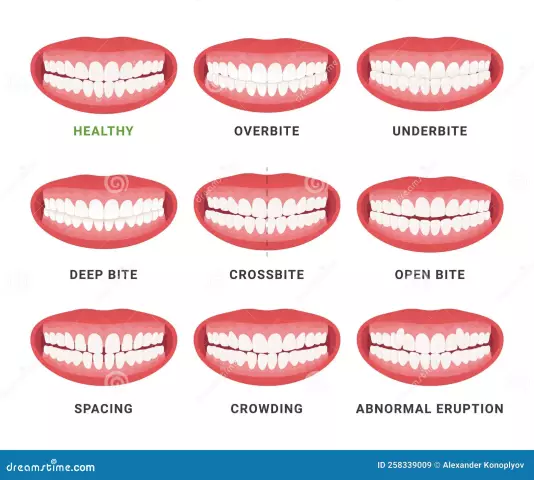- Author Rachel Wainwright wainwright@abchealthonline.com.
- Public 2023-12-15 07:39.
- Last modified 2025-11-02 20:14.
Why does a baby bite the breast: 6 reasons
Mother's milk is the most suitable food for a newborn. This is a unique natural product that contains an optimal set of nutrients and is best adapted for the baby to develop normally and be protected from the harmful factors of an unusual external environment. Unfortunately, breastfeeding is not always straightforward. It happens that the baby starts to bite the breast, causing significant inconvenience to the mother. Some women even shorten the feeding period by weaning the baby prematurely.
This can be avoided if you understand and eliminate the causes that cause the baby to bite the breast.
Runny nose in a child
When a baby has a stuffy nose, it is not possible to suck normally - he suffocates during feeding, and therefore may bite the nipple. If the baby, attached to the breast, begins to convulsively gasp for air, turn his head and whimper, it is possible that he just has a runny nose. Then you need to urgently consult a pediatrician to start treatment. Until the baby has recovered, he should be fed upright so that mucus does not block the nasal passages.

Source: depositphotos.com
Teething
Many babies begin to bite at their breasts during teething. The reason is simple: the child experiences severe itching in the gums and tries to bite whatever gets in his mouth. This should not be a reason to stop breastfeeding. In order for a child to get rid of unpleasant sensations and develop chewing skills, he needs to be given special teethers for teeth. In addition, there are folk remedies that help to survive this period without problems. For example, gentle massage of the gums with honey or a decoction of medicinal herbs that have an antiseptic effect (chamomile, calendula, sage, etc.) is very effective.

Source: depositphotos.com
Improper attachment
A young mother with no breastfeeding experience may not properly latch her newborn to her breast. In this case, the baby captures only the very edge of the nipple and bites it so as not to lose it during the sucking process. It is easy to fix the situation: a woman should consult with an experienced pediatrician or health visitor and learn how to hold the baby during feeding so that he captures the entire nipple and part of the skin around it with his mouth.

Source: depositphotos.com
Pacifier habit
It happens that the baby bites the breast, confusing the nipple with a pacifier. He does not yet distinguish a toy from a food source. Experienced doctors advise in such cases to interrupt the feeding process and resume it after a few minutes. If the baby has no other reasons for biting the nipple, he will eventually wean to do it.

Source: depositphotos.com
Lack of milk
If the body of a nursing mother produces too little milk (for example, when the baby is older and his appetite has increased), the baby may bite the breast, trying to get more food. You can determine this by tracking how he gains weight. If the baby really lacks nutrients, it is necessary to stimulate lactation or consult a pediatrician about the introduction of artificial feeding.

Source: depositphotos.com
Lack of attention from mom
In the process of breastfeeding, the mother not only provides the newborn with the most suitable food for him. She teaches the baby to communicate, enjoy life, creates a sense of security for him.
And if a woman during feeding is distracted by extraneous matters (talking on the phone or on the Internet, viewing e-mail, reading, etc.), the child feels it. He may bite at the breast to attract the attention of the mother and to get the missing feelings of comfort and security. The child will become calmer if the mother, during feeding, starts talking to him tenderly, stroking, confirming her interest.

Source: depositphotos.com
A baby under the age of five to six months does not yet know how to clearly express his emotions. Every deviation from normal behavior indicates that the child has real problems. The mother's task is to figure out the reasons and eliminate what causes discomfort to both her and the child.
YouTube video related to the article:

Maria Kulkes Medical journalist About the author
Education: First Moscow State Medical University named after I. M. Sechenov, specialty "General Medicine".
Found a mistake in the text? Select it and press Ctrl + Enter.






